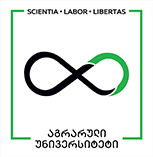School of Veterinary Medicine
Veterinary Integrated Master's Program Description
Within the Veterinary Integrated Master's Program of the Agricultural University of Georgia, significant attention is given to the correct planning and implementation of theoretical and practical training. This approach ensures the practical application of subjects in parallel with their theoretical study. Interactive learning, clinical case-based learning, and action-based learning contribute to developing students' practical (clinical, research) skills and their in-depth understanding of the subjects covered by the program. This, in turn, prepares competitive and qualified specialists for the labor market. Additionally, the program provides graduates with a solid foundation for pursuing doctoral studies and a potential scientific career.
After completing the five-year program, graduates possess not only fundamental theoretical knowledge but also important specific skills, such as the ability to work with modern scientific equipment, conduct research, analytical thinking, and problem-solving capabilities.
In the fifth year, all students learn the basics of scientific research and independently choose a direction of interest, preparing a master's thesis in which they study and research current issues in the field under the supervision of their advisor. Students are given the opportunity to familiarize themselves with current research methods and the latest achievements in the field.
Most of the faculty are directly and actively involved in research, including significant international projects, within the infrastructure of the scientific institutes of the Agricultural University of Georgia. This provides students with the opportunity to engage in scientific research if they wish to do so.
Upon successful completion of the 5-year program, the graduate is awarded the qualification Master of Veterinary Medicine.
Action-Based Learning
Approximately one-third of the credits in the Veterinary Integrated Master's Program are devoted to laboratory and/or practical courses. Accordingly, significant teaching time is dedicated to laboratory studies, which are based on action-based learning (learning-by-doing). This approach means that students learn the profession through individual work, performing tasks, experiments, and analysis independently.
Students participate in laboratory/practical studies in the teaching laboratories of physics, chemistry, biology, microbiology, veterinary medicine, and other areas located at Kakha Bendukidze Campus.
The program includes practice in the veterinary clinic of the Agricultural University of Georgia, where students can develop the necessary skills for a veterinarian in a real working environment. During the training practice, students are divided into small groups, and each group is assigned a training practice coordinator. This coordinator, an employee of the veterinary clinic, supervises the students' practical activities.
Areas of Employment
After completing the Veterinary Integrated Master's Program, graduates may be employed in a variety of positions in various organizations, including:
- Veterinary clinics and laboratories
- Livestock and poultry farms, beekeeping, and fishing farms
- Pharmaceutical enterprises and veterinary pharmacies
- Pet stores, zoos, vivariums, aquariums, terrariums, racetracks, and animal shelters
- Scientific-research and educational institutions
- International projects
Curriculum
The curriculum of the Veterinary Integrated Master's Program includes 307 credits, divided into two main components:
General Education Component, which in turn includes the University General Education and Veterinary General Education modules. The General Education Component consists of 75 credits.
- University General Education - each student enrolled in the university's bachelor's programs, in addition to specialized subjects, also takes general subjects, contributing to the elevation of general education and the expansion of their field of interests.
- General Veterinary Education - this module includes such subjects as: Theoretical and Laboratory courses in General Chemistry, Organic Chemistry, General Physics, Fundamentals of Scientific R
The specialty education component (specialty - veterinary medicine), which, in turn, includes basic sciences, specialty component, and specialty electives modules. The volume of the specialty education component is 232 credits.
Specialty Education Component which in turn includes the Foundational Sciences, Specialization Component and Elective Subjects of the Specialty modules. The Specialty Education Component consists of 232 credits.
This includes basic sciences, a specialty component, and specialty electives modules.
- Foundational Sciences - this module comprises essential subjects needed for studying the field, such as: Theoretical and Laboratory courses in General Biology, Zoology and Biostatistics.
- Specialization Component - this module covers essential theoretical, laboratory, and practical courses needed to study Veterinary M Subjects include Anatomy, Histology and Embryology, Physiology, Pathological Anatomy, Pathophysiology, Pharmacology, Toxicology, Parasitic Diseases, Veterinary Microbiology and Infectious Diseases, Operative Surgery, General Surgery, Private Surgery, and more. Additionally, this module includes practical training at the veterinary clinic of the Agricultural University of Georgia, where students develop essential skills in a real working environment. During practical training, students are divided into small groups, each supervised by a training practice coordinator, an employee of the veterinary clinic.
- Elective Subjects of the Specialty: This module allows students to deepen their knowledge in various areas of veterinary medicine according to their interests. Students also have the option to pursue an additional 15 credits of courses outside the program requirements at no extra cost.
Admission conditions 2023
Code:
0050105 Copied!
Copied!
Seats Quantity 27
| National exam | Weight | Acceptable Places | Minimum Score |
|---|---|---|---|
| ქართული ენა და ლიტერატურა | 4 | ||
| უცხო ენა | 3 | ||
| Optional exam | |||
| ან მათემატიკა | 5 | 3 | 40% |
| ან ისტორია | 5 | 8 | 60% |
| ან ქიმია | 5 | 3 | 60% |
| ან ბიოლოგია | 5 | 13 | 60% |
Subjects
ქართული ენა და ლიტერატურა
Subject Weight
4Acceptable Places
Minimum Score
უცხო ენა
Subject Weight
3Acceptable Places
Minimum Score
ან მათემატიკა
Subject Weight
5Acceptable Places
3Minimum Score
40%ან ისტორია
Subject Weight
5Acceptable Places
8Minimum Score
60%ან ქიმია
Subject Weight
5Acceptable Places
3Minimum Score
60%ან ბიოლოგია
Subject Weight
5Acceptable Places
13Minimum Score
60%About the school
The Agricultural University of Georgia School of Veterinary Medicine offers 2 accredited programs:
- Veterinary Integrated Master's Program
- Veterinarian Training Program
Additionally, the School of Veterinary Medicine offers a PhD Program in Agricultural Sciences with the School of Natural Sciences and Biotechnology and the School of Agronomy and Landscape Management.
School of Veterinary Medicine programs are rich with laboratory and hands-on learning. Laboratory and practical studies are conducted using the learning-by-doing method, which means that students learn the profession through individual work, performing tasks, tests, and analysis independently. Additionally, student groups for laboratory studies are kept small, not exceeding 20 people, which in turn positively impacts student learning outcomes.
Students are provided laboratory/practical studies in teaching laboratories for physics, chemistry, biology, microbiology, veterinary medicine, and other areas located at Kakha Bendukidze Campus.
The Agricultural University of Georgia has a veterinary clinic where students of the School of Veterinary Medicine have practical lessons, enabling them to develop essential veterinary skills in a real working environment.
Furthermore, many of the school's faculty are directly and actively involved in research, including significant international projects, within the infrastructure of scientific institutes of the Agricultural University of Georgia. This provides students with the opportunity to engage in scientific research if so desired. For PhD students, it offers an excellent opportunity to conduct in-depth research with experienced researchers.

22 December 2025
Lasha-Giorgi Japaridze will lead the veterinary services

19 December 2025
Nino Kushitashvili and Giorgi Loladze, will undertake professional training program in Estonia

18 December 2025
Barbare Kurtsikidze will undertake the ESAVS program in Bucharest

17 December 2025
Natia Robakidze will participate in a veterinary cardiology masterclass in Dubai
Dean

Coordinator





